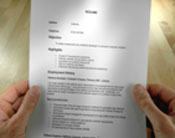Industry Specific Resume for an Actuarial Position
|
|
 | |
| Writing an industry specific resume requires emphasis on skills and experience dealing with statistical methods to assess that risk. |
1. Your resume needs to target the industry that you are trying to begin your career in, or transition into. In this case, your resume should be specific to the financial impact of risk and support the Actuarial science industry.
2. Specifically targeting the employer of interest requires in-depth research of the company you are applying to, because that is what will be expected of you if you are employed with an Actuarial organization. Instead of a broad reference to your experience, your resume should be specific to the company’s implied or specified needs.
3. Your resume needs to target a position that is open, because each job has unique knowledge, skills and abilities relating to the company’s requirements. However, with your targeted research of the company, you may discover an unadvertised requirement that would warrant a closer look at your skills. This well crafted information should be included in your tailored cover letter to open communications with Actuarial personnel in the company.
Other considerations for writing industry specific resumes for Actuarial positions are:
- A strong background in mathematics is essential because of the emphasis on statistics and quantitative analysis.
- Seven out of ten Actuaries are employed within the insurance industry, meaning most Actuaries go into insurance than any other industry. The Actuaries employed in the insurance industry, and can specialize in property insurance, casualty insurance, life insurance or health insurance. Other actuaries work primarily in the finance industry, or specifically in employee benefits.
- The actuary industry is actually quite small, generating a small number of job openings each year. The fastest economical growth in the industry is in computer services, data processing services, health services, actuarial consulting services and management industries.
 | |
| Focus on using concise and accurate resume information in an easy-to-read format that will attract positive attention to your abilities. |
When writing a specific resume for the industry, you need to have a strong understanding of what type of specialty you will focus on. If you want to specialize in casualty and property insurance, list relevant skills and experience relating to that specialty. There is a wide range of specialties within the Actuary industry. The more skills you have, the better off you will be. With such a diverse offering in the field, the more you can apply those skills to business, insurance and mathematics, the more you will be able to stand out from other applicants. Often it is how these skills are represented in a resume and cover letter that makes a favorable impression with potential employers. Again, using concise and accurate information in an easy to read resume will attract positive attention to your abilities because it defines the nature of the industry.
Positive attention can also be created with the use of jargon and language that shows you have a good working knowledge of the industry. There is a caution with the use of jargon and acronyms. Going over board is more of a distraction then an emphasis. The following paragraph lists some keywords employers use in computer aided searches within the Actuary industry. When they are relevant to your job search, using these words in your resume will help create a favorable impression for a potential employer.
- Data Analysis
- Insurance Design
- Pension Plan Design
- Financial Plan Design
- Business Knowledge
- Mathematics
- Statistics
- Risk Classification
- Pension Planning
- Employee Benefits
- Finance
- Casualty Insurance
- Health Insurance
- Property Insurance
- Life Insurance
- Company Policy
- Draft a master resume that lists all of your experiences and qualifications. Then each time you craft an industry or job specific resume draw out the specific information that applies to your current job search.
- Unless you have more than ten years of experience in the actuarial field, keep your resume length to a single page. You want your resume to stand out, but not because of its length.
- Keep acronyms to a minimum. In a complex industry, too much professional jargon will take away from the substance of your experience and education.
- Your resume is a tool to attract interviews for potential employment. The time to elaborate on your qualifications is when you are called in for an interview.




